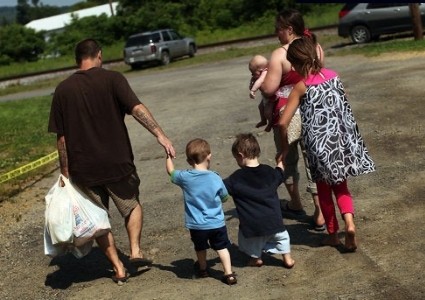Pledging
These are the original issues in this subcategory

You May Pledge Your Support For This Issue With A Monetary
Donation And By Writing A Letter To Your Representatives
- PROPERTY TAXES
- UPPER INCOME TAX RATES

Poverty is defined as not having enough material possessions or income to cover a person’s basic personal needs, often to the degree where one lacks food, clothing and shelter. Our child poverty rate of 16% is nearly one-and-a-half times higher than that for adults ages 18-64 (11%) and nearly twice as high than that for adults 65 and older (10%). In 2020, nearly 30% of Black and American Indian/Alaska Native children and 24% of Hispanic children were poor compared with 9% of white children. These children are more likely to have poor academic achievement, drop out of high school and later become unemployed, experience economic hardship and be involved in the criminal justice system. Children who experience poverty are also more likely to be poor at age 30 than children who were never poor. Lost productivity, worsened health and increased crime stemming from child poverty cost the nation about $700 billion dollars a year, or about 3.5% of GDP.
Child tax credits reduce a taxpayer's liability on a dollar-for-dollar basis and are intended to provide an extra measure of tax relief for taxpayers with qualifying dependents. This credit, currently $2,000, is given to impoverished American taxpayers for each dependent child who is under the age of 17. If the credit exceeds taxes owed, families may receive up to $1,400 per child as a refund. Other dependents — including children ages 17–18 and full-time college students ages 19–24 — can receive a nonrefundable credit of up to $500 each. Similar allowances exist in almost every country in the European Union, as well as in Canada and Australia.
It is estimated that a modest increase in this tax credit could reduce childhood poverty to 9.5% and reduce deep poverty — the share of kids living on half the poverty line or less — could be cut nearly in half, to 2.4%. This is exactly what the passage of the COVID-19 stimulus bill, the American Rescue Plan, accomplished. However, the $3,600 tax credit it provided will expire in a year unless made permanent through additional legislation.
Pending Legislation: H.R.928 – American Family Act of 2021
Sponsor: Rep. Rosa DeLauro (CT)
Status: House Committee on Ways and Means
Chair: Rep. Richard Neal (MA)
Tweet
Child tax credits reduce a taxpayer's liability on a dollar-for-dollar basis and are intended to provide an extra measure of tax relief for taxpayers with qualifying dependents. This credit, currently $2,000, is given to impoverished American taxpayers for each dependent child who is under the age of 17. If the credit exceeds taxes owed, families may receive up to $1,400 per child as a refund. Other dependents — including children ages 17–18 and full-time college students ages 19–24 — can receive a nonrefundable credit of up to $500 each. Similar allowances exist in almost every country in the European Union, as well as in Canada and Australia.
It is estimated that a modest increase in this tax credit could reduce childhood poverty to 9.5% and reduce deep poverty — the share of kids living on half the poverty line or less — could be cut nearly in half, to 2.4%. This is exactly what the passage of the COVID-19 stimulus bill, the American Rescue Plan, accomplished. However, the $3,600 tax credit it provided will expire in a year unless made permanent through additional legislation.
Pending Legislation: H.R.928 – American Family Act of 2021
Sponsor: Rep. Rosa DeLauro (CT)
Status: House Committee on Ways and Means
Chair: Rep. Richard Neal (MA)
Tweet
- I oppose reforming current child tax credit policy and wish to donate resources to the campaign committee of Speaker Nancy Pelosi (CA).
- I support modifying the child tax credit to: 1.) Making the credit fully refundable. 2.) Increase the amount of the credit and allow an additional credit for children who are under six years of age. 3.) Requiring the amount of the credit to be adjusted annually for inflation. 4.) Require the Department of the Treasury to establish a program for making advance payments of the credit on a monthly basis. And wish to donate resources to the campaign committee of Rep. Richard Neal (MA) and/or to an advocate group currently working with this issue.
- I support modifying the child tax credit to:
1.) Making the credit fully refundable.
2.) Increase the amount of the credit and allow an additional credit for children who are under six years of age.
3.) Requiring the amount of the credit to be adjusted annually for inflation.
4.) Require the Department of the Treasury to establish a program for making advance payments of the credit on a monthly basis.
And wish to donate resources to the campaign committee of Rep. Richard Neal (MA) and/or to an advocate group currently working with this issue.
Donation And By Writing A Letter To Your Representatives
Please login to pledge
Pledge Period - Opening Date
July 12, 2021
Pledge Period - Closing Date
July 18, 2021
Trustee Election - Begins
July 19, 2021
Suggest a worthy trustee for consideration before Day 16 of this presentation cycle. (Maximum 60 Characters)